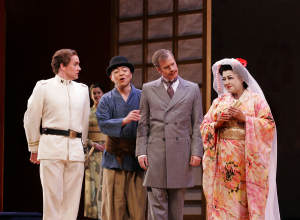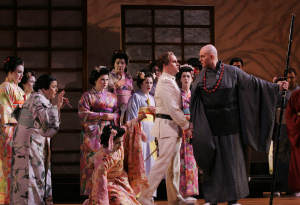Puccini,
Madama Butterfly:
(Production from The Minnesota Opera and Opera Theatre
of St. Louis) Soloists and Orchestra Arizona Opera, Antony
Walker(conductor) Tucson, AZ 3and 4.02. 2007 (NdV)
Cast
Butterfly-Indira Mahajan Feb. 3, Barbara Divis Feb. 4
Pinkerton- Kip Wilborn Feb.3, Jose Luis Duval, Feb. 4
Sharpless- Philip Cutlip
Suzuki-Jane Dutton
Kate Pinkerton-Kara Harris
Goro- Joseph Hu
Prince Yamadori- Robert Barefield
Production
Director- Colin Graham
Lighting- Robert Denton
Sets & Costumes- Neil Patel and David C. Woolard
General and Artistic Director-Joel Revzen

Many sopranos, regardless
of their vocal category,have yearned to include Puccini's
Madama Butterfly into their repertoire and unfortunately
the annals are filled with stories of their unsuccessful
attempts. But that was not the case with the Arizona Opera
Company which had the good fortune of presenting two sopranos,
Indira Mahajan and Barbara Divis in the role of Butterfly
who easily met the numerous vocal and dramatic challenges
Puccini so passionately delineated for his beloved tragic
heroine. These two portrayals, however, were only part
of what made this Butterfly production surely one of the
best examples of how regional opera is capable of rivaling
any international opera company's presentation of a Puccini
work.
To be honest, along with Mahajan and Divis, conductor
Antony Walker and director Colin Graham were unknowns
to audiences here in Tucson,
aided little by the sketchy bios in the program. But with
five successful performances in Phoenix and three in Tucson,
at the end of January and the beginning of February, they
will now be remembered for their moving collaborative
undertaking of Puccini's most intimate work.
What proved so edifying about this production was its
overall approach, a sort of "going back to basics,"
if you will. Walker took Butterfly's journey, from young
innocent to a mature woman who is faced with difficult
emotional choices, to heart. He followed Puccini's dictum
that the action, and its accompanying music, ought to
evolve with a slow building tenderness giving each character
not only his or her full musical expression, but enough
time for each to establish a persona, no matter the size
of the role. Two examples of this were Joseph Hu, as Goro,
the marrriage broker and Kara Harris, as Kate Pinkerton,
Lt. Pinkerton's American wife.
And from what transpired on the stage, it seemed as if
the conductor and Graham worked very well together so
as to give Puccini's opera its full dramatic impact. As
with Puccini's other versions,* the Brescia version, which
Graham chose to mount here, has its fans and its detractors,
but it is enough to say this one was received with full
enthusiasm when presented in 1904 while the first
Milan
version was deplored. Graham carefully wove his directorial
fabric so that it would follow the seamless story line
that Puccini methodically devised leading to Butterfly's
suicide, and its emotionally spent conclusion.
Ironically, the two sections of the production that seemed
to pull the audience into the opera emotionally were the
ones that are not presented today. In the love duet at
the end of Act One, Walker and Graham returned about 37
bars of music from the Brescia version where Butterfly
relates to Pinkerton that her first impression of the
Lieutenant was that his people were barbarians which,
in the ongoing duet, he was able to convince her otherwise,
making the moments ever so intense when they finally came
to consummate their love.
Of the two casts, Mahajan and her Pinkerton, Kip Wilborn
made the stronger impression by slowly making their way
through the duet, accenting every melodic nuance Puccini
interlaced into the longest love duet of any of his operas.
And in the last act, the meeting between Butterfly and
Kate Pinkerton was intensified with additional dialogue
which contrasted Butterfly's personal sacrifice of giving
up her son with Kate's ambivalent feelings of taking Butterfly's
son and promising to love him as her own. This extended
scene allowed Phillip Cutlip as the American Counsel,
Sharpless, Jane Dutton's Suzuki and Kara Harris' Kate
to give a more complete picture of their personal sorrow
over Butterfly's plight. In reality, this version may
not work for other productions, but Walker and Graham
made it seem that this version was the one audiences would
most love to hear and see. Divis and her partner, Jose
Luis Duval also proved to be equal to the director's guiding
hand in telling Butterfly's story. But Mahajan portrayed
Butterfly's dying moments with such pathos it brought
her Pinkerton to lie beside her in commiserating grief
giving the audience their desired lump in the throat.
The whole production, kimonas in faded pastels, lighting
that expressed Puccini's music throughout the evening
and Neil Patel's set, simplicity itself, using just the
interior of Butterfly's house with sliding panels to point
out what part of Butterfly's heart was breaking at every
moment certainly made this one of Arizona Opera's moments
to remember.
Nicholas del Vecchio
Pictures © Scott Humbert
* For a comprehensive look at Puccini's four versions
of Madama Butterfly see Michele Girardi's Puccini,
His International Art, University of Chicago Press
and Julian Budden's Puccini His Life and Works, Oxford
University Press.
The
Arizona Opera web site is Here
The
author's web site Living at the Opera is Here




